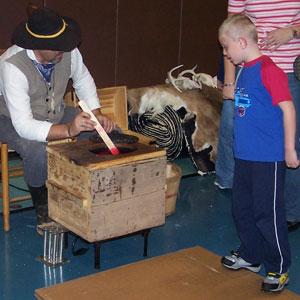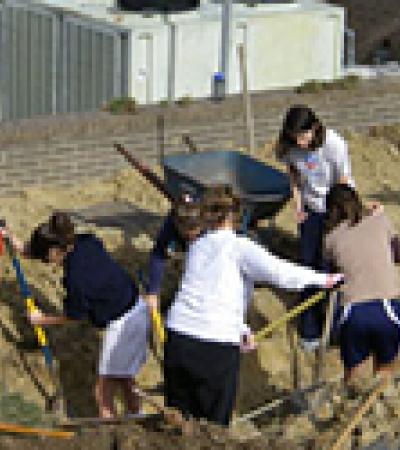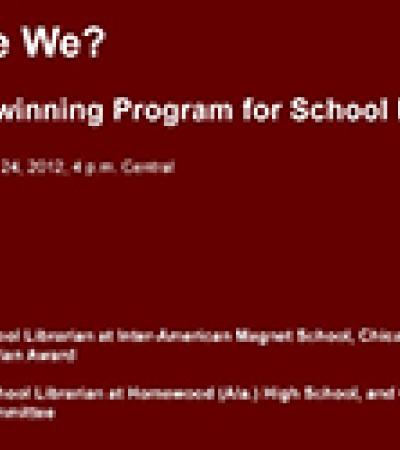
On a beautiful Sunday morning in June, I was standing in the convention center in Anaheim, California. I was there on behalf of my school, to receive a check for $4,000 and a plaque as part of the Sara Jaffarian School Library Program Award for Exemplary Humanities Programming. This wonderful celebration was part of an incredible journey that started with a PTA Executive Board meeting in Wheeling, West Virginia. I serve on this board because parental support is important to the success of any school library program. By working together we create meaningful learning experiences, specifically tailored to our students and learning community. At this particular meeting, the group was discussing plans for a family event to be held in the fall. Every year the school library hosts a curriculum based event for our families to enjoy together. This year we wanted to feature a social studies–themed topic and to focus on pioneer life. It would need to be interactive to keep the children entertained while learning. The principal approved the plan and the next step was to find qualified presenters who could create the type of program we wanted.
A series of phone calls to local colleges, museums, and the Cooperative Extension Agency led us to the scholars of West Virginia University’s “History Hits the Road” program. They were experts in the time period and experienced presenters. I spoke with project director Dean Hardman and explained what was needed. He discussed the activities they could provide. Based on our phone conversations and a series of emails, he created a preliminary schedule. I shared this information with the PTA board, our school’s Local School Improvement Council, the principal, and the Faculty Senate. These groups offered suggestions to improve and customize the program for our students. It was important to get all of the key players involved in beginning of this project. If people feel they are part of the planning process, they are more committed to making the project successful. Mr. Hardman and I worked together to finalize the program. The plan included a full day of activities for the students as well as the family fun night program we had originally hoped to provide. We received an itemized list of the costs. After combining PTA funds, library money, and school general fund money, we still didn’t have enough to fund everything we wanted to do. I discussed our situation with Mr. Hardman and he suggested I contact the West Virginia Humanities Council. The grant coordinator from the council suggested the school apply for a mini-grant. I was a first time grant writer and wasn’t sure I could be successful. I expressed my concerns to the grant coordinator, who was very understanding and helped by sending copies of grants that had been funded in the past and even offered to read my first draft. She offered sound suggestions and gave me confidence to complete the process. Our application was successful and the necessary funds were secured.
Now that the program was becoming a reality, it was time to work with the school staff. I asked to be included on the next faculty senate agenda. We discussed the final schedule and each grade level met and decided how they were going to extend the program into their classrooms. Everyone worked together to select literature, web sites, and activities to enhance the learning experience at every grade level. All of the teachers were happy to participate because they had been part of the planning and had a choice of how they were going to be involved in the program. On the appointed day, Mr. Hardman and his team arrived and really helped our students develop a sense of what life was like in the 1800s. Our family night was the best attended of any of our prior events, and our evaluations were positive.
Our goals were met and our children and their families participated in a memorable, educational experience. This success would not have been possible without the partnerships of the school library media center, the PTA board, the principal, the Local School Improvement Council, the Faculty Senate, the West Virginia Humanities Council, and the scholars of “History Hits the Road.” Everyone focused on what was best for the children and how to create the best event possible. The prize money that accompanied the Jaffarian award will be used to bring “History Hits the Road” back to Woodsdale to provide new experiences for our students and to purchase new items for the library. Hopefully our project will inspire other librarians to find new ways to work together and form meaningful partnerships to provide meaningful humanities programming for their students.
I’ve shared my journey to encourage those of you working in elementary or junior high libraries to consider submitting an application. To be successful you need to keep a few things in mind. The award is for an innovative humanities program that has already been completed. It is not to fund something that you hope to accomplish in the future. Humanities topics include literature, history, philosophy, performing arts, and social studies. The activities must be closely tied to school content standards and classroom learning. You will need to provide evidence that your program has had an impact on your school community. Letters of support are the best way to show that parents, administrators, and community leaders were aware of and involved in your program. Good library programming doesn’t happen in isolation, so evidence that collaborative relationships between the library, parents, teachers, scholars, and community groups were an integral part of the project is essential to your success. Your application should be so clearly written that another librarian could follow your process and create a similar program in their own school situation. Finally, the winner needs to be willing to educate others as part of a conference program or in an online showcase. As with all applications, be sure and follow all of the directions and make sure you include all of the information the committee is asking for. Good luck on your journey!



